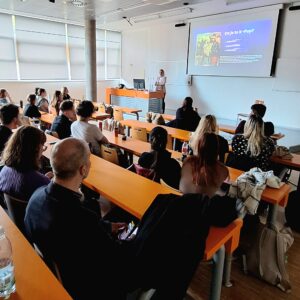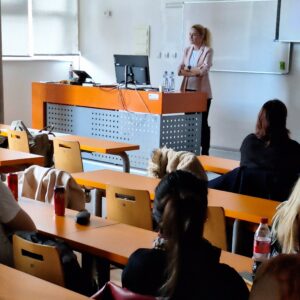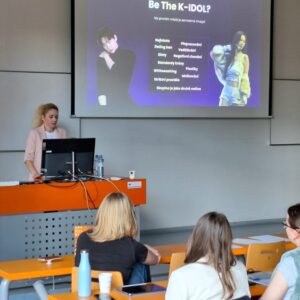K-pop Trends and Their Impact on the Korean Economy: A Lecture by Sandra Burdová
As part of Innovation Week, the Center for Asian Studies (CAS) hosted a lecture on Tuesday, April 8, titled “New Trends in K-pop and Their Significance for the Korean Economy,” presented by Sandra Burdová. Sandra has long been involved in promoting K-pop and Korean culture in the Czech Republic, including her work as a reporter for the Korean Culture and Information Service under the Ministry of Culture, Sports and Tourism.
During the lecture, students were introduced to the fundamentals of K-pop, the major players (K-pop agencies), and the core values these companies uphold. The session continued with a discussion on the five generations of K-pop, the groups that represent each era, and their defining characteristics—for example, the fifth generation is known for its use of virtual reality and AI. Sandra also addressed the darker side of the industry, which is often hidden from the public eye. Topics included strict diets, dating bans, unrealistic beauty standards, whitewashing, rigid rules, and the pressure on idols to undergo plastic surgery.
Despite these challenges, by the end of 2022, there were approximately 1,170 trainees affiliated with various K-pop agencies, according to the Korea Creative Content Agency (KOCCA). This highlights the strong desire among many young Koreans to become K-pop idols, even in the face of demanding conditions and intense competition.
Sandra concluded the lecture by emphasizing the global influence of K-pop and Korean culture. Some fans are so captivated by the idol image that they undergo multiple plastic surgeries in an attempt to emulate the Korean beauty ideal.
Thanks to the active participation of students, the lecture evolved into a lively discussion, demonstrating that K-pop is not just a music genre but a contemporary cultural phenomenon that sparks meaningful conversations—both among dedicated fans and those just beginning to explore it.


